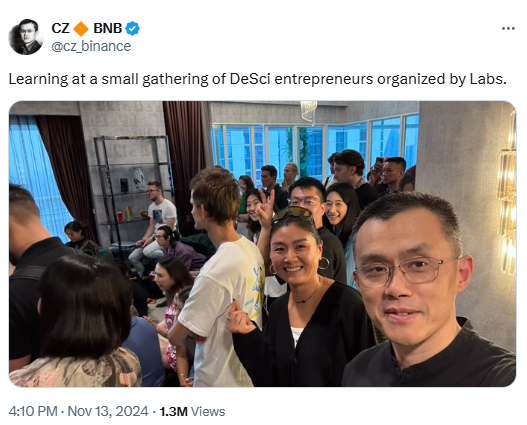Crypto leaders, including Changpeng “CZ” Zhao, Brian Armstrong, and Vitalik Buterin, have turned their attention to Decentralized Science (DeSci), a movement leveraging blockchain to revolutionize scientific research.
CZ’s Transition to DeSci
Since leaving Binance, CZ has shown a growing interest in the DeSci space. Last November, he revealed that he was studying biotech and exploring how to use crypto technology to accelerate funding and research in the field. Just yesterday, CZ participated in a small gathering of DeSci entrepreneurs organized by Labs, where Ethereum founder Vitalik Buterin was also in attendance.

Buterin’s Vision for DeSci
Buterin sees DeSci as a way to improve science through decentralized technologies like blockchain and cryptocurrency. In an interview, he highlighted how cryptocurrencies can enable more diverse and democratic funding for research, moving beyond traditional institutions.
One key mechanism is quadratic funding, which prioritizes projects with broad community support. Buterin also sees Decentralized Autonomous Organizations (DAOs) as a tool for organizing research funding.
Additionally, blockchain could address issues in academia, such as flaws in peer review and citation practices, by providing transparent tracking of contributions and ensuring fairer attribution. DeSci aims to create a more open, inclusive, and efficient scientific ecosystem.
Brian Armstrong’s Commitment to Scientific Advancement
Coinbase CEO Brian Armstrong has also strongly committed to advancing scientific research through decentralized platforms. He has backed ResearchHub, a platform that fosters open scientific collaboration by allowing researchers to share, discover, and engage in scientific discourse.
Essentially, DeSci seeks to address several challenges in traditional scientific research, including funding, data sharing, and publishing. The involvement of industry leaders like CZ, Armstrong, and Buterin brings significant attention and resources to the sector, potentially accelerating its development and adoption.
Disclaimer: The information presented in this article is for informational and educational purposes only. The article does not constitute financial advice or advice of any kind. Coin Edition is not responsible for any losses incurred as a result of the utilization of content, products, or services mentioned. Readers are advised to exercise caution before taking any action related to the company.
Crypto leaders, including Changpeng “CZ” Zhao, Brian Armstrong, and Vitalik Buterin, have turned their attention to Decentralized Science (DeSci), a movement leveraging blockchain to revolutionize scientific research.
CZ’s Transition to DeSci
Since leaving Binance, CZ has shown a growing interest in the DeSci space. Last November, he revealed that he was studying biotech and exploring how to use crypto technology to accelerate funding and research in the field. Just yesterday, CZ participated in a small gathering of DeSci entrepreneurs organized by Labs, where Ethereum founder Vitalik Buterin was also in attendance.

Buterin’s Vision for DeSci
Buterin sees DeSci as a way to improve science through decentralized technologies like blockchain and cryptocurrency. In an interview, he highlighted how cryptocurrencies can enable more diverse and democratic funding for research, moving beyond traditional institutions.
One key mechanism is quadratic funding, which prioritizes projects with broad community support. Buterin also sees Decentralized Autonomous Organizations (DAOs) as a tool for organizing research funding.
Additionally, blockchain could address issues in academia, such as flaws in peer review and citation practices, by providing transparent tracking of contributions and ensuring fairer attribution. DeSci aims to create a more open, inclusive, and efficient scientific ecosystem.
Brian Armstrong’s Commitment to Scientific Advancement
Coinbase CEO Brian Armstrong has also strongly committed to advancing scientific research through decentralized platforms. He has backed ResearchHub, a platform that fosters open scientific collaboration by allowing researchers to share, discover, and engage in scientific discourse.
Essentially, DeSci seeks to address several challenges in traditional scientific research, including funding, data sharing, and publishing. The involvement of industry leaders like CZ, Armstrong, and Buterin brings significant attention and resources to the sector, potentially accelerating its development and adoption.
Disclaimer: The information presented in this article is for informational and educational purposes only. The article does not constitute financial advice or advice of any kind. Coin Edition is not responsible for any losses incurred as a result of the utilization of content, products, or services mentioned. Readers are advised to exercise caution before taking any action related to the company.





